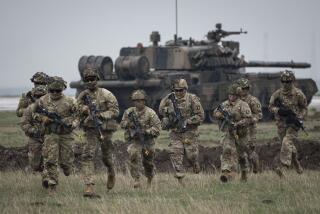Kosovo Isn’t Bosnia; the Serbs are Strong
LONDON — Airstrikes can buttress diplomacy, but on their own can rarely stop fighting on the ground. In Bosnia, I called for NATO airstrikes against the Serbs in 1993 to pressure them to accept the Vance-Owen peace plan and, later, to enforce the European Union action plan and the Contact Group plan.
Today, however, I am very concerned that, after 50 years of NATO keeping the peace in Europe, its credibility is being put at risk over Kosovo. Already there have been too many NATO threats that have not been followed through.
Assuming that President Slobodan Milosevic does not back down and airstrikes do take place on Serbian air defenses and airfields in Kosovo, what is likely to happen? I fear an immediate and massive fight between Serb troops and the Kosovo Liberation Army, with hand-to-hand fighting in populated areas on which airstrikes will have very little impact.
NATO is telling everyone that their ground troops in Macedonia will not move into Kosovo unless there is an agreement over autonomy. At present, NATO forces are insufficient to push the Serbs out of Kosovo. Public support in NATO countries for escalating the airstrikes to hit targets in Belgrade and other cities in Serbia may, after a week or so, fade.
The experience of airstrikes on Iraq demonstrate that, to stop fighting, military action on the ground is also necessary. To have NATO forces standing by in Macedonia, waiting as the Serbs crush the KLA despite the bombing, is a recipe for NATO’s humiliation. Surely, it is wiser to first build up NATO’s land capability to the point where Milosevic knows he facing overwhelming force, in the air and on the land.
Western leaders seem to think the situation in Kosovo is analogous to that in Bosnia in August and September, 1995. In fact, the situations are very different.
In the summer of 1995, the Croatian army had defeated the Croatian Serbs and were poised to move into Bosnia. The Bosnian government forces were stronger than they had ever been and were gaining territory. Also, the government of Bosnia-Herzegovina had asked NATO to use air power. The United Nations supported NATO action. And Russia was realistic. U.N. forces in Bosnia had been preparing for NATO airstrikes for two months, so there was less risk of hostages. The French and British had brought artillery into Bosnia that was capable of hitting Serb gun positions and tanks with pinpoint accuracy.
The Serbs themselves were deeply divided. Milosevic was exasperated, having been pushing the Pale Serbs to accept a division of 49% of the territory of Bosnia-Herzegovina since November, 1993.
In Kosovo today, the Serbs are building up a dominating position on the ground capable of inflicting great damage on the KLA and further cleansing of the civilian Albanian population. NATO would be attacking the territory of the Federal Republic of Yugoslavia, an action opposed in the U.N. by Russia and China. The Serbs in Yugoslavia are united over Kosovo in a way they have never been over Bosnia.
NATO cannot afford to have its bluff called. In choosing to bomb, NATO must not assume the Serbs will turn on Milosevic or demand that he sue for peace. In short, there are sound reasons for believing that only the realistic threat of NATO troops moving into Kosovo, under the cover of air attacks, will force Milosevic to accept the Rambouillet terms.
If Western governments have neither the political nor military will to commit to a credible strategy for imposing autonomy in Kosovo, they would be better advised to negotiate independence now.
Kosovo will ultimately become independent. A “Balkan deal” would see the whole of Kosovo leaving Serbia and being granted independence. In exchange, the Bosnian Serbs in the eastern part of Republika Serbska in Bosnia-Herzegovina would become part of Serbia. On a hectare-for-hectare exchange, that would allow some widening of the corridor from Sarajevo to the Muslims in Gorazde.
The Pale Serbs remain the most intransigent opponents of the Dayton accords. The Serbs from Brcko and Banja Luka are cooperating with Dayton. With EU and U.S. pressure on Zagreb to make the Croats live up to the Dayton accords, and with such a territorial exchange, Bosnia could, in months, become a truly integrated country.
More to Read
Sign up for Essential California
The most important California stories and recommendations in your inbox every morning.
You may occasionally receive promotional content from the Los Angeles Times.










